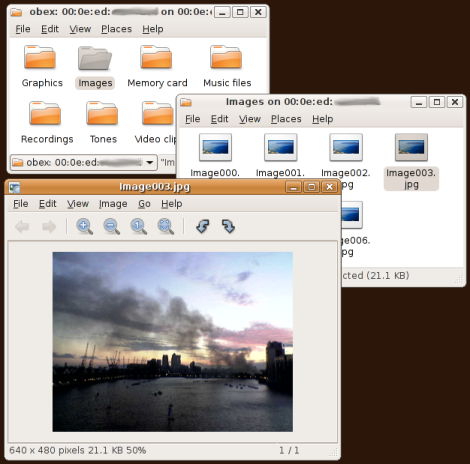In my previous entry about using the Maemo obex-module on the desktop, Johan Hedberg mentioned that bluez-utils 3.7 included equivalent interfaces to the osso-gwconnect daemon used by the method. Since then, the copy of bluez-utils in Edgy has been updated to 3.7, and the necessary interfaces are enabled in hcid by default.
Before trying to modify the VFS code, I thought I’d experiment a bit with the D-BUS interfaces via the D-BUS python bindings. Most of the interesting method calls exist on the org.bluez.Adapter interface. We can easily get the default adapter with the following code:
import dbus
bus = dbus.SystemBus()
manager = dbus.Interface(
bus.get_object('org.bluez', '/org/bluez'),
'org.bluez.Manager')
adapter = dbus.Interface(
bus.get_object('org.bluez', manager.DefaultAdapter()),
'org.bluez.Adapter')
At this point, it is possible to perform discovery:
import dbus.glib
import gtk
def remote_device_found(addr, class_, rssi):
print 'Found:', addr
def discovery_complete():
gtk.main_quit()
adapter.connect_to_signal('RemoteDeviceFound', remote_device_found)
adapter.connect_to_signal('DiscoveryCompleted', discovery_completed)
adapter.DiscoverDevices()
gtk.main()
It is also possible to configure periodic discovery, which will send signals about devices that get found, disappear, or change name, so we could easily implement the obex: directory listing that shows all the devices found that support OBEX-FTP. One thing that isn’t clear from the API documentation is what happens if multiple programs try to start or stop discovery at the same time. It looks like the second program will get a org.bluez.Error.InProgress error when it tries to begin discovery. Ideally discovery would stay active til the last program interested in the results closed. Maybe I am misunderstanding it a bit and you can actually use the interface in this mode.
When we want to actually do OBEX-FTP with the device, we can establish the rfcomm connection:
rfcomm = dbus.Interface(
bus.get_object('org.bluez', manager.DefaultAdapter()),
'org.bluez.RFCOMM')
# will return e.g. /dev/rfcomm0
devname = rfcomm.Connect(bluetooth_address, 'ftp')
# communicate with the phone via the new rfcomm device
rfcomm.Disconnect(devname)
So it should be possible to modify obex-method to function with only the daemons included in Ubuntu Edgy. All that’s left is to do the actual work 🙂.
